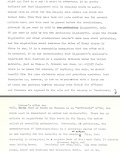Mergers Didn't Really Used to Be a Thing
Prior to the 1980s, corporate combinations were an embarrassment, an admission of failure. They certainly were not commonplace. Today they are normal. And that's because culture follows the law.
Welcome to BIG, a newsletter on the politics of monopoly power. If you’d like to sign up to receive issues over email, you can do so here
One thing that was enjoyable about researching my book Goliath was looking into the archives and seeing just how different Americans understood economic power prior to the 1980s. It was like an entirely different country. Mergers, for instance, were just not very common or important, and people were fairly surprised when they happened. The very first modern hostile takeover attempt was in 1974, and it utterly shocked Wall Street. Such things among gentlemen, and Wall Street was a gentlemanly place, simply were not done.
Even into the late part of that decade, unfriendly mergers were understood as immoral. For instance, a reader sent me a personal letter from famed children’s author Alvin Schwartz, written in the late 1970s. Schwartz was immensely popular; his Scary Stories to Tell in the Dark books sold more than 7 million copies and were/are very popular with children.
In this letter, Schwartz was remarking on the sale of his publisher, J.D. Lippincott, to Harpers. At the time, publishers were mostly family-owned and privately held, and the era of junk bond-fueled takeover barons had barely started. Schwartz was simply shocked, but also noted the dangers of increasing concentration in the industry that were already apparent.
“What fascinates me, however, is how an organization with a large sum of money can purchase another company even though the officers sand founders are opposed to the sale and the company is functioning well. Harper’s offer was known in finance as an “unfriendly” offer, one which must be considered no matter how distasteful. There was an article on acquisitions by this route in the Times. The author called it socially undesirable. Certainly, in publishing, the concentration of decision-making in a shrinking number of hands is not healthy for the industry or the country or authors. Time, inc currently is attempting to acquire Book of the Month Club. it already owns Little, Brown, Doubleday, Literary Guild, and now owns Dell. RCA owns Random House, Knopf, and Patheon and Ballantine Books. And so on.”
Today publishing is highly consolidated, and there’s an antitrust trial over the merger of Penguin/Random House and Simon & Schuster. People think the government will win, but it’s not clear what happens to Simon & Schuster afterwards. Does it sell to private equity? Another publisher? Another media conglomerate? This notion that something must be done is weird. Simon & Schuster is profitable and well-run. It doesn’t need to be sold, it’s doing what it should be doing.
Up until the 1970s, businesses were understood as social institutions designed to profit by adding something of value to the world. That was a function of laws that prohibited most mergers. But because of Reagan’s administrative rewrite of merger law, that changed, and merger waves have characterized the American economy ever since. The culture in turn moved to accept predation as just the way things work.
Hopefully, as the FTC and DOJ push back on mergers, that attitude will change. And one day, we won’t argue about merger law, we’ll simply wonder, totally mystified, how anyone could have ever let so many destructive mergers happen.



Hey Matt, how come there's no way to contact you????
I thought this was an interesting subject, I can't find any way on your site to email you
RObb
https://www.washingtonpost.com/us-policy/2022/09/07/irs-free-efile-biden/?utm_campaign=wp_post_most&utm_medium=email&utm_source=newsletter&wpisrc=nl_most&carta-url=https%3A%2F%2Fs2.washingtonpost.com%2Fcar-ln-tr%2F37dab7c%2F6318c1e9b8c9803d3031c162%2F5d497f02ade4e24bfc3a728f%2F53%2F72%2F6318c1e9b8c9803d3031c162&wp_cu=d7a8ef2d6116d856289c3a6f2bd17392%7C8F73AA1E9E1C0F9DE0530100007F08B0
The industry has devoted millions of dollars over the years to defeating IRS plans to establish public filing software programs. Intuit and H&R Block have spent a combined $63.3 million in federal lobbying since 2011 on e-file and other issues.
Between April and July, H&R Block retained two lobbying firms, plus sent three in-house lobbyists to Congress at a cost of $760,000, on issues including “tax administration,” “Internal Revenue Service funding,” and “government populated returns,” according to federal disclosures.
Intuit spent $50,000 in lobbying expenses on issues including “IRS taxpayer assistance programs,” over the same period.
"The past is a foreign country, they do things differently there."